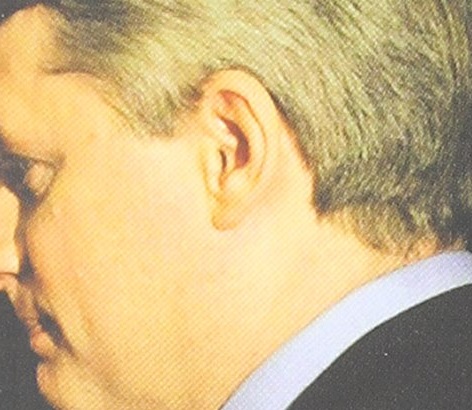MacLean’s columnist, Paul Wells, wrote a book on Prime Minister Stephen Harper entitled “The longer I’m Prime Minister: Stephen Harper and Canada 2006 –“. In this book, the author warns that as the years pass with Harper in office, Canada is being radically transformed.
Truthfully, Canada is being transformed because of Stephen Harper’s government in Ottawa – just not in the way that Paul Wells anticipated it would be. Wells pictured our federal government being fashioned into a reflection of a Reagan-esque Washington, where an enduring small-c government will be his legacy.
If Wells is right and that was Harper’s goal, then he hasn’t accomplished it. Canada’s Economic Action Plan was one of this country’s largest ever public spending policies and Harper’s government has run deficits each year in office, except for the last budget.
But Stephen Harper has changed Canada, and in at least one case irreparably, because of his influence on Provincial politics.
Over the course of the past 50 years, provincial leaders have postured during campaigns that Ottawa has been unfair to their province. Trudeau’s National Energy Policy was pure gold to the Alberta PC’s led by Peter Lougheed. Anti Liberal sentiment has endured and kept the PC’s in power for more than a generation after Trudeau left office.
Canadian voters inherently understand the need for checks and balances by electing a strong Premier who promises to guard against the power of the federal government.
The trend in Ontario is if the Prime Minister is a Liberal, then the Premier will be a PC – and vice versa. This trend has been going on for generations.
In reaction to Stephen Harper being Prime Minister, Ontarians have sleep-walked into re-electing Liberals who have put in place policies that have devastated the Ontario economy. Seven years have passed since the great recession and Ontario shows scant few signs of recovery. The crown jewel of the Ontario economy, it’s manufacturing sector, has left Ontario after years of artificially high energy costs and unnecessary red tape. Local economies once buttressed by auto manufacturing are left reeling under Kathleen Wynne’s government.
The longer that Stephen Harper remains Prime Minister, the deeper the chasm for Ontarians created under provincial Liberal mismanagement. With public debt loads skyrocketing, it will soon be impossible for the next generation to find its footing after a decade of reckless waste.
What is going on in Ontario today under the ardently left wing government of Kathleen Wynne should be a splash of cold water in the faces of Albertans who recently voted to give a majority mandate to the NDP.
Alberta had 42 years of provincial PC power. During that time, they saw four conservative Prime Ministers, Joe Clark, Brian Mulroney, Kim Campbell, and Stephen Harper. (Clark and Campbell held power for only a few months and they had little impact on provincial politics.)
When Mulroney won his massive majority by piecing together a winning coalition of conservative voters in Alberta and Quebec, his government elicited a jarring reaction from Alberta voters. Rather than change the provincial government, Albertans birthed a new federal party, the Reform Party, and booted all of the federal PC’s out of the province in the next election.
And the provincial vs. federal dynamic played a role in last night’s Alberta election results. A former high ranking cabinet minister in the Harper government, Jim Prentice was soundly rejected by voters, ending the PC dynasty as the party moves from first to third in the provincial legislature. Simply put, Jim Prentice was too close to Stephen Harper. And when Alberta’s only sound opposition, former Wildrose leader Danielle Smith, shocked her party to join Prentice in an attempt to “strengthen forces” we saw the idea backfire magnificently in last night’s results with a crushing Orange wave. Alberta voters did not trust Prentice to provide the checks and balances that will see the province through the economic crisis brought on by low oil prices.
Does an Alberta Orange Wave mean that Stephen Harper’s support in Alberta is waning? Will we see prominent cabinet ministers defeated on October 19th?
Anti-Harperites might think so but there really isn’t a chance the CPC will lose seats in Alberta this time around.
Alberta has an Albertan Prime Minister. Many of the most powerful cabinet ministers are also Albertan. When Harper retires, his successor will likely also be an Albertan.
Alberta voters have people in Ottawa that they know they can count on.
On the other hand, the two other federal options can be easily discounted. Mulcair and Trudeau are both from Montreal and each have a checkered history with Alberta oil interests.
Rather than change the Prime Minister, Alberta voters decided that they will change the provincial government instead .
Checks and balances will be restored in the voter’s minds. For the Silo, Maddie Di Muccio.

ABOUT MADDIE:
A former municipal town councillor in Newmarket, Ontario, Di Muccio often appears as a political pundit in the media and her freelance columns in the Toronto Sun discuss political issues across Canada. She currently serves as President of York Region Taxpayer’s Coalition and President of the Society for Quality Education.



Cutting costs and red tape puts us back in business
Before Christmas, Todd Smith, Minister of Economic Development, Job Creation and Trade, announced over 30 actions to cut red tape in Ontario. This included regulatory changes to cut costs for businesses, decreasing barriers across municipal and provincial jurisdictions, and increasing business access to government investment.
As well, Minister Smith announced another part of the Ontario Open for Business Action Plan—the Restoring Ontario’s Competiveness Act. If passed, this act will further eliminate red tape and burdensome regulation. The goal is to give businesses more flexibility, reduce costs and to produce an environment where more jobs can be created right here at home.
Over the years, government has created many rules making it tough for businesses to compete. The Ontario’s Toxics Reduction Act, for example, is a bill that I fought tooth and nail during my time as environment critic. It requires businesses to report publicly on the use of certain toxic substances and chemicals and present a reduction plan every five years. However, the federal government also has a Chemicals Management Plan that requires facilities to undergo the same task of reporting their chemical use and reductions. Both governments require the same information.
Why the unnecessary duplication? For this particular example and more, we plan to end overlap and unnecessary paperwork—paperwork where businesses have to report the same information to multiple jurisdictions of government. Thus, as of 2021, the federal government will solely cover all toxic substances, regulated by the Ontario’s Toxics Reduction Act.
By eliminating such duplication, companies will save both time and money. Placing the regulation under one government will enable companies to save on administrative costs and operate more efficiently. Facilities will financially benefit from not having to pay to prepare redundant reviews and reports.
Other changes outlined in the Open for Business Action Plan include changes to the Employment Standards Act, 2000. The plan will eliminate the requirements for employers to seek ministry approval for excess hours of work and overtime averaging. This has proven to be a time consuming requirement and an administrative constraint, which offers little to no benefit for employers and employees alike. Without it, employers would have much more flexibility in scheduling and planning operations.
Most of the regulatory burden and unnecessary duplication that companies face inhibit the efficiency and efficacy of their administration. Ontario’s Toxic Reduction Act and the Employment Standards Act just to name a few, almost seem by design to nuisance businesses with unwanted administration and forms to fill out.
Under the current government, we plan to eliminate the burdens that negatively affect businesses and their administrative function as a way to improve their efficiency and to cut overhead costs. We plan to give Ontario businesses a competitive advantage, which will keep Ontarians working at home, not abroad.
Our government wants to get out of the way of those who create jobs in our province and The Restoring Ontario’s Competiveness Act will go a long way in accomplishing this. We strive to tell the world Ontario is open for business. We are going to lower business costs and make Ontario a strong profitable province where everyone who wants to work can have the chance and the opportunity to do just that.
Toby Barrett MPP for Haldimand-Norfolk